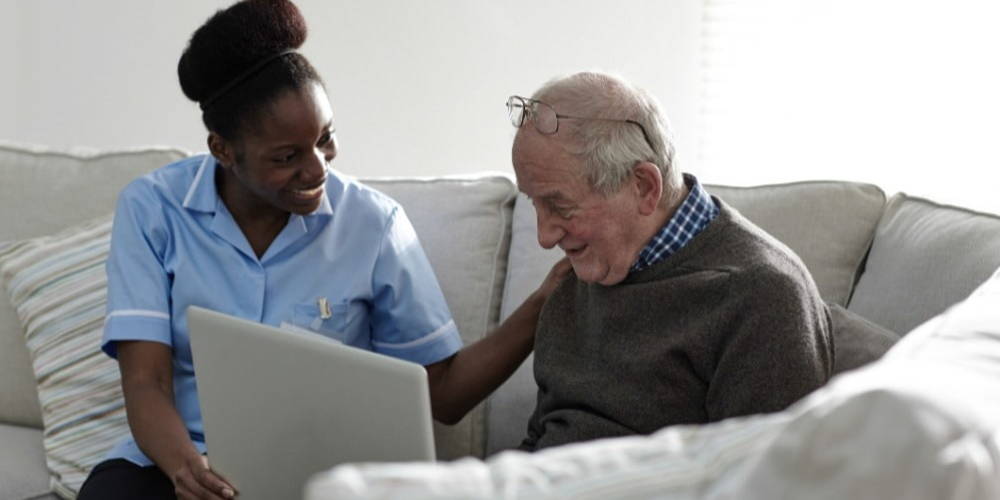Allied Health Assistants at Vivir Healthcare play an important role in the high level of support we can provide our clients across Australia. While our Allied Health Assistants support our clinicians across Occupational Therapy, Physiotherapy, and Speech Therapy in both the community home care and residential aged care settings, their biggest impact is in the Telehealth space. With the rapidly evolving healthcare space, the integration of telehealth services has emerged as a ground-breaking solution to bridge gaps in accessibility and provide timely health care to individuals across diverse settings. Allied Health Assistants take on special responsibilities to facilitate this. In this blog, we explore the role of Allied Health Assistants and how they ensure smooth telehealth consultations with our clients as part of our Telehealth To You Program.
What is an Allied Health Assistant and what are their roles and responsibilities?
Allied Heath Assistants (AHAs) work under the supervision and delegation of an allied health professional (AHP). In Australia, AHAs normally need to have a certificate level qualification in health assistance to highlight they have skills and knowledge to perform in the role.
At Vivir Healthcare our AHA’s and clinicians work collaboratively to provide holistic care to our clients so we can provide our clients with the best outcomes in a timely manner. In particularly, our AHA’s support clinicians with our virtual Telehealth To You (TH2U) service. They play a pivotal role in supporting the delivery of virtual care through hands-on assistance such as assessments and interventions as delegated by the treating clinician and technical expertise.
Some of their roles and responsibilities include delivering exercise and wellness programs, taking environmental measurements, taking client anthropometric measurements, supporting speech assessments and interventions, adjusting equipment, and attending and supporting equipment trials in the home and community.
Allied Health Assistants and Telehealth
Our AHAs undertake a variety of tasks to facilitate telehealth appointments, including setting up video calls, engaging clients during assessments, and supporting communication between the client and the Clinician. Additionally, they follow specific instructions delegated by clinicians, such as taking measurements and capturing photos or videos as required.
Vivir Healthcare prioritises the seamless operation of telehealth sessions by implementing screening procedures at the time of booking to ensure client suitability. Clear explanations of telehealth processes are provided to clients and their support person, along with detailed instructions and technical support to mitigate any potential issues prior to appointments. Once this is all understood, a video link is sent to the client and their support person with appointment details.
Maintaining patient confidentiality and privacy is paramount in telehealth consultations. Vivir Healthcare employs secure platforms like Microsoft Teams for encrypted communication, obtains verbal or written consent prior to services, and ensures that video calls are neither saved nor recorded without explicit permission.
The professional development required by AHA’s need to support Telehealth services
Our AHAs undergo comprehensive training and professional development to effectively support telehealth services. This includes completing discipline-specific modules, participating in one-on-one inductions, and acquiring treatment competencies to ensure proficiency in delegated tasks. AHAs are also committed to upholding the same standards of care in telehealth as in face-to-face consultations. Under the supervision of the treating clinician, they adhere to delegated interventions and maintain regular communication to address any client concerns or queries.
Indeed, Telehealth services have significantly improved access to care for individuals in remote communities, where resources may be scarce or wait times extensive. We have a received a number of referrals in rural Queensland and NSW regions where there are limited Occupational Therapists or long waitlists. And by providing both Telehealth and TH2U services, we have been able to assess high risk clients and provide interventions with a fast turnaround, such as implementation of home modifications (i.e. rails) or equipment to support daily occupations and mobility. By offering timely assessments and interventions, Vivir Healthcare has addressed critical needs to support clients' ongoing care in rural and regional communities in Australia.
In conclusion, Allied Health Assistants play an indispensable role in the success of telehealth services – ensuring accessibility, quality, and efficiency in the delivery of healthcare. Their professionalism and efficiency contribute to smooth assessments, dispelling misconceptions about virtual services and highlighting their effectiveness. And as technology continues to advance, their contributions at Vivir Healthcare will remain essential in shaping the future of our healthcare delivery, transforming lives and communities along the way, no matter where they live.
